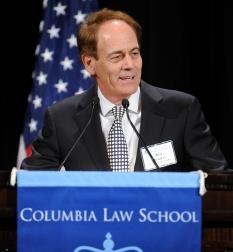Innovative Partnership Caps Richman Centers First Year
Media Contact: Public Affairs, 212-854-2650 or [email protected]
New York, May 29, 2012—The Richard Paul Richman Center for Business, Law, and Public Policy ended its highly successful first year by announcing a partnership with Intelligence Squared U.S., an Oxford-style debate series, to co-sponsor two debates on important public issues.
The first debate will take place on Oct. 24, 2012, at the Kaufman Center in New York City as part of the debate series’ fall 2012 season. Glenn Hubbard, Dean of Columbia Business School, will be one of the four panelists discussing domestic tax policy. A second debate will be held in the spring of 2013.
The public policy focus of Intelligence Squared makes it a fitting partner for the Richman Center. The program seeks to promote public discourse by presenting intellectually responsible points of view on both sides of contentious issues. Panelists are among the world’s leading authorities in their areas of expertise, with two arguing for and two arguing against a carefully worded motion. Members of a live audience vote electronically both before and after the debate to determine the winning side.
The Richman Center was established in 2011 with a $10 million grant from the Richard Paul and Ellen S. Richman Private Family Foundation to promote evidence-based public policy and foster dialogue and debate at the intersection of business, markets, and the law. Richard P. Richman ’72, MBA ’73, (below) is chairman of The Richman Group, one of the largest owners and developers of rental housing in the nation.
For example, a full-day conference on financial markets in late March, titled “Financial Risk and Regulation: Unfinished Business,” featured Law School and Business School faculty members—as well as representatives of top law firms and organizations such as the World Bank and the International Monetary Fund—discussing the impact of the Dodd-Frank financial reform law and Basel III capital requirements for U.S. financial institutions. The conference was organized by Charles W. Calomiris, the Henry Kaufman Professor of Financial Institutions at the Business School, and Ira Millstein ‘49, a senior partner at Weil, Gotshal & Manges.
Corporate executives and Wall Street analysts attended an April conference on housing policy, titled “America's Housing Crisis: Private-Sector Responses and Public Policy Innovation,” which featured a keynote address by University Professor and Nobel Prize–winning economist Joseph E. Stiglitz. The event was co-sponsored by Zillow, the real estate data firm, and the Progressive Policy Institute, a Washington, D.C., think tank.
The center also sponsored a public lecture series featuring speakers such as Peter Fisher, senior managing director of the investment management firm BlackRock, and Law School Professor Jeffrey Gordon, the Richard Paul Richman Professor of Law, who discussed the intended and unintended consequences of financial regulation. Professor Timothy Wu, the Isidor and Seville Sulzbacher Professor of Law, and Professor Willy Shih of Harvard Business School spoke about the role of intellectual property rights in the context of China’s manufacturing prowess. Seth Pinsky, president of the New York City Economic Development Corporation, discussed economic development projects in the city and the role lawyers can play.
Additionally, Law School and Business School faculty members were among the experts who led a series of workshops sponsored by the Richman Center.
Looking ahead, Morrison said the Richman Centers hopes to support research and collaborative teaching by professors at both schools, as well as to introduce new courses that will further discussion among students about important policy questions.
# # #
Columbia Law School, founded in 1858, stands at the forefront of legal education and of the law in a global society. Columbia Law School combines traditional strengths in corporate law and financial regulation, international and comparative law, property, contracts, constitutional law, and administrative law with pioneering work in intellectual property, digital technology, tax law and policy, national security, sexuality and gender, and environmental law.
Join us on Facebook
Follow us on Twitter: www.twitter.com/columbialaw
